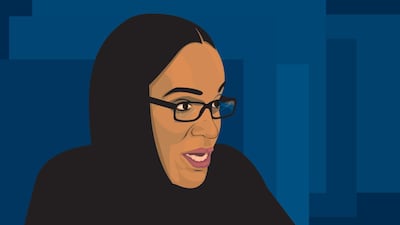Emirati author Mariam Jumaa Faraj died early last week.
By all accounts, the short story writer was a fiercely honest woman, one of few, but deeply meaningful, words.
Faraj, who was born in the fifties, published her first short story collection, Fairuz, in 1988. The stories would have made both Americana-surrealist David Lynch and Henry David Thoreau, who reflected upon simple life in natural surroundings, proud.
Her characters were unreliable narrators. Romantics living in a reality alluded to through dreams. There were palm trees with mystical scrying powers, who would warn of an impending war. Many of her stories paint a dreamlike vision of life in the pre-oil Emirates. Her words also paid tribute to the customs and traditions of migrant labourers. They spoke of a reality that was out of reach from the fluorescent lights of skyscrapers.
Her second collection Ma' (Water) was published in 1994. These stories revolved around the pursuit of individual freedom amid conservative societies. Some of her stories were anthologised in English by Denys Johnson-Davies, who is known for his translation of works by regional literary heavyweights such as Palestinian poet Mahmoud Darwish and Egyptian author Naguib Mahfouz.
She regularly took part in feminist initiatives around the country, and in an interview with Al Ittihad in 2013, Faraj described her upbringing in the pre-oil Gulf. "It was a time when a woman's place was considered at home."
“It was a subject of conflict between my father, who preferred I stay at home, and my mother and grandmother. They secretly enrolled me in a school in Kuwait, where we were staying at the time. My father was surprised when he eventually found out but he let me continue.”
Faraj travelled to the UAE for her secondary education before going to the University of Baghdad to pursue a degree in English Literature. She returned to the UAE after graduating, finding work at cultural and social institutions. In 1996, she travelled to the UK to further her education.
Speaking about her love for language, Faraj said: “Arabic is my mother tongue,” she said, “While English is my aunt. And indeed, when I went to London, it wasn’t with any touristic intent. I went there to attain my masters in language and translation.”
Upon her return, Faraj joined Al Bayan as a translator. She also wrote a regular column at the newspaper until her death. She retired briefly from Al Bayan in 2006 with the intent of pursuing her creative work, but then took a detour after her parents fell ill.
“I had to take a step back from writing after my mother fell ill. She had cancer. It’s no secret that we were very close,” Faraj said. “And she asked me to be by her side. I lived with her and stopped communicating with most people, including my friends.
"I was there with my mother, in a private world. We went through the many stages of the illness together. I couldn’t write then because I couldn’t focus. My mother’s pains made me as weary as they made her. Physically and mentally.”
Within two weeks of her mother’s death, Faraj’s father fell ill, and she insisted that he move in with her. “Our friendship grew stronger as a result,” she said. “Towards the end, he couldn’t speak, after which his beautiful heart gave out. These are the reasons why I was kept from my creative work, but my parents, God rest their souls, were always my priority.”
Aisha Al Nuaimi, an assistant professor at UAE University, told The National that despite the hardships in Faraj's life, she always managed to approach things with a positive attitude.
“It’s a shame that creative individuals are not given their due until after they are gone,” Al Nuaimi, who was close friends to Faraj, laments.
"Faraj struggled for a long time. She struggled with work and in her personal life. But despite it all, her positive spirit never relented. She took care of her parents and was like a mother to her seven siblings."
Al Nuaimi says that Faraj had gone to the UK to seek treatment for an undisclosed illness. She returned a few months ago and was seemingly in good health.
“She was happy to have come back to Dubai and had begun working on her writing again. I spoke to her the day before she died. She was telling me how she wanted to re-establish her relationship with people, how she felt full of life," Al Nuami said.
"And then, in the span of 24 hours, she was hospitalised and was gone.”
The Emirates has lost a powerful female voice, but one whose words live on.


